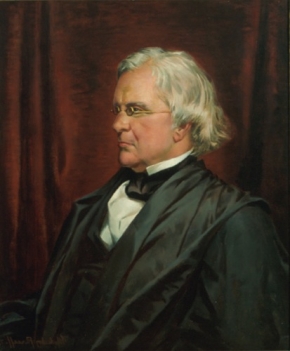You are here
Circuit Court Opinions:
Associate Justice Robert Cooper Grier, United States v. Smith (1861)

United States v. Smith, 27 F. Cas. 1134 (C.C.E.D. Pa. 1861) (No. 16,318) [Third Circuit]
At the outset of the Civil War, President Abraham Lincoln issued a proclamation ordering a blockade of all ports within the Confederacy. The proclamation also stated that blockade runners—including the crews of both Confederate warships and privateers—would be considered pirates. An 1820 statute defining piracy as a capital offense meant that Confederate sailors would be subject to execution if captured.
In July 1861, the crew of the privateering vessel Jefferson Davis seized the schooner Enchantress and attempted to take it to Charleston, South Carolina. They were intercepted and captured by a U.S. Navy vessel and brought to Philadelphia for trial, where they were indicted under the 1820 act. The defendants claimed that because they had acted under the authority of the Confederate government they should be treated as enemies under the laws of war rather than as pirates. If deemed prisoners of war, they would not face execution.
In charging the jury, Justice Grier ruled this defense invalid. “[I]t does not follow,” he explained, “that every band of conspirators who may combine together for the purpose of rebellion or revolution or overturning the government of which they are citizens or subjects, become ipso facto a separate and independent member of the great family of sovereign states.” Grier pointed to the fact that a civil war was underway to suppress the rebellion as definitive proof that the United States did not recognize the Confederacy as a separate state. The judicial branch was obligated, in Grier’s view, to treat the Confederacy in a manner consistent with the views of the executive and legislative branches. The defendants were convicted of piracy and sentenced to death.
While Grier felt obligated to rule in the manner he did, he was unhappy with the result. When charging the jury in another piracy case soon after, he stated that he considered it foolish to treat enemy sailors differently from soldiers captured on land. Complaining that the large number of piracy cases was delaying other important federal court matters, Grier said that he would refuse to try any more of them. Soon after, Lincoln relented on his original proclamation, and Confederate blockade runners were reclassified as prisoners of war.
Despite their conviction and sentence, the crew of the Jefferson Davis were not executed. As a result of threats by Confederate President Jefferson Davis to execute Union prisoners in retaliation, the men were included in a prisoner exchange.
